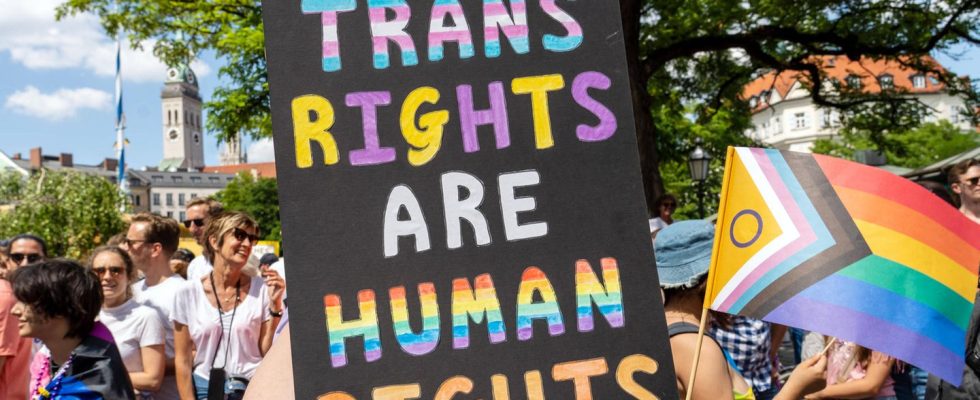Opinion
Self-Determination Act
Men don’t need an invitation to enter shelters for women
Trans Rights are Human Rights – agrees with our author. She therefore finds the Self-Determination Act urgently overdue.
© Imago Images
It’s finally here – the Self-Determination Act. But criticism comes from all corners. Our author can only understand part of the criticism: the self-determination law must become more self-determined.
The Self-Determination Act is here and the clamor is great. With the new law, everyone can suddenly “have their gender changed” and enter women’s saunas with impunity. “But the shelters for women,” critics exclaim indignantly. It’s as if they had never taken part in physical education class, when the teacher decided to give the girls another helping hand and then, quite accidentally, of course, the hand landed on their butt.
Men do not need an invitation to enter women’s shelters, nor do they need legitimacy. They have also never needed permission to harass women and have repeatedly gotten away with abusive behavior. If you want to turn these shelters into unsafe places, no gender entry has prevented you from doing so and no gender entry will prevent you in the future.
trans* people are not the problem
As a young woman, I have experienced situations myself several times in which I felt insecure because of men and I know numerous stories from girlfriends in which they had to experience abusive behavior from men. Nothing is further from my mind than wanting to deny women encroaching experiences with men, because unfortunately there are still far too many of them in 2023. But trans* people and their right to a decent life, their right to a self-determined life, are not the problem.
At the end of the day, the problem is still men who behave in abusive ways, and a self-determination law will not change that. Because they are now pushing into our rooms without any legitimation if they feel like it. Trans* people, in turn, are further suspected of being evil and abusive through these arguments.
Trans* people are much more cautious. Retreat rather than actively enter shelters for fear of discrimination. Friends of mine who are trans* put up with being addressed with the wrong pronouns on a daily basis in order not to attract too much attention. Most of them haven’t been to the swimming pool or sauna for a long time. Much too great the concern of hostilities in the changing room in which they would actually feel more comfortable. The dysphoria, i.e. the feeling of being unwell in one’s own body, is too great when it simply doesn’t match what most would associate with one’s own gender. That’s already a problem when going to the public toilet. Which one is the right one now, if I don’t identify as male or female, but as non-binary?
The self-determination law needs more self-determination
Of course, one can and must criticize the law in a meaningful way. It would go something like this: The Self-Determination Act is not far-reaching enough and continues to open the floodgates to discrimination against trans* people. Justice Minister Marco Buschmann (FDP), for example, has included an explicit reference to domiciliary rights in the law, which makes it clear: Anyone who owns a sauna and has doubts about the gender of a person should continue to throw them out, even with a female gender entry. The law also contains a clause that effectively overrides it in time of war – at least when the gender entry is changed to female. The argument: otherwise men would take advantage of the law to evade military service.
Authorities should also be informed if the gender entry is changed. According to the law, this should ensure that no one can avoid criminal prosecution by changing the gender entry. All of these regulations aim to prevent misuse of the law, but in the end they only cause further discrimination – legitimated by law. In any case, such a transmission of the data is not intended in the event of a name change due to a wedding. And that’s just the beginning of the areas where there is an urgent need to catch up.
“The fact that a man changes his gender entry with all the associated consequences just to enter a women’s sauna or a toilet and harass women is unreal,” writes Ferda Ataman, the Federal Commissioner for Anti-Discrimination, in a statement to “Zeit” and thus brings her the absurdity in a nutshell. She is not alone in this. Many trans* and queer activists have been criticizing this since the first draft and have been calling for significant improvements to the draft law for a long time before it is finally passed in the Bundestag.
Adjust step size
In any case, the law as it stands is anything but an attack on the rights of women, because they don’t want to restrict trans* and non-binary people. However, it continues to stoke the already worsening trans*phobia in Germany and ensures that trans* people continue to be stigmatized. The law should protect trans* and non-binary people and not make them even more under general suspicion through discriminatory passages. Self-determination and anti-discrimination, finally listening to those affected, is different.
But despite all justified criticism – the law is an important step in the right direction and many trans* and non-binary people have been waiting for these overdue innovations for a long time. Finally, they no longer have to face the discriminatory procedure of the old, unconstitutional law. The only thing that needs to be adjusted now is the increment, so that in the end we also get a self-determination law that deserves its name.



